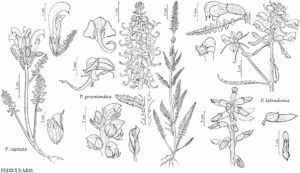Pedicularis capitata
Nouv. Mém. Soc. Imp. Naturalistes Moscou 5: 100. 1817.
Plants 2–13.5 cm. Leaves: basal 2 or 3, blade ovate or elliptic, 10–40 x 5–20 mm, 2 (or 3) -pinnatifid, margins of adjacent lobes nonoverlapping or extensively overlapping distally, serrate, surfaces glabrous or hirsute; cauline 0–2, blade elliptic, 5–25 x 5–10 mm, 2-pinnatifid, margins of adjacent lobes nonoverlapping or extensively overlapping distally, serrate, surfaces scattered hispid. Racemes simple, capitate, 1 or 2, exceeding basal leaves, each 2–8-flowered; bracts subulate to narrowly lanceolate, 10–20 (–50) x 6–8 mm, undivided proximally, undivided or 1-pinnatifid or 2-pinnatifid distally, proximal margins entire, distal serrate, surfaces sparsely tomentose. Pedicels 2–3 mm. Flowers: calyx 10–15 mm, hirsute, lobes 5, triangular to spatulate, 4–6 mm, apex serrate, glabrous; corolla 19–40 mm, tube light yellow, sometimes cream to pink, 5–20 mm; galea light yellow, sometimes cream to pink, apically sometimes diffuse purple, 12–20 mm, beakless, margins entire medially and distally, apex arching beyond abaxial lip; abaxial lip light yellow, sometimes cream to pink, 10–15 mm. 2n = 16 (Asia).
Phenology: Flowering Jun–Aug.
Habitat: Moist arctic and alpine tundras, heathlands, alpine slopes.
Elevation: 10–2100 m.
Distribution
Greenland, Alta., B.C., N.W.T., Nunavut, Que., Yukon, Alaska, n Asia
Discussion
Inflorescences of Pedicularis capitata display no more than five clustered flowers; the long, vertical corolla tube and curved galea that arches over the appressed, broad lobes of the abaxial lip are distinctive. The tip of the galea can be the same color as the corolla tube and abaxial lip but sometimes is a diffuse pink to purple and not distinctly bicolored as in the galeas of P. flammea or P. oederi, with which it is often confused.
Selected References
None.
